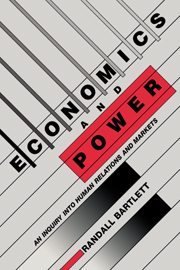2 - An economic concept of power
Published online by Cambridge University Press: 18 September 2009
Summary
How then to build a tightly reasoned theory of power that can be usefully applied in an economic context and can be called economic? The question is the more difficult because there are nearly as many definitions of “economic” as there are of power. To use Marxist or institutional economics is to keep the consideration of power on the periphery of the discipline, no matter how well constructed the theory. To use neoclassical economics is to risk confrontation with, and perhaps confirmation of, a basic ideological precept dominant among its practitioners. In the former case, power could be more easily found, but it might be too easily accepted, for evidence of its presence is there desired. It would be easily discarded, or simply ignored, by others, for in their terms the analysis is not truly “economic.”
Analysis that arises directly from the restrictive foundations of neoclassical economics will be challenged, criticized, and perhaps distrusted by all – by neoclassicists because it violates ideology and by others because of its suspect methodology. If it stands after that, it will be hard to deny. Neoclassicists would have to accept the potential for power or admit to the charge of ideological, rather than purely logical, analysis.
- Type
- Chapter
- Information
- Economics and PowerAn Inquiry into Human Relations and Markets, pp. 17 - 36Publisher: Cambridge University PressPrint publication year: 1989



